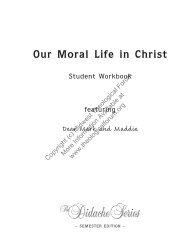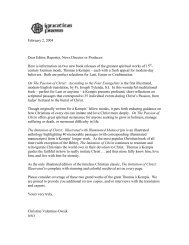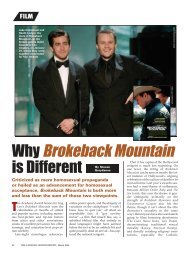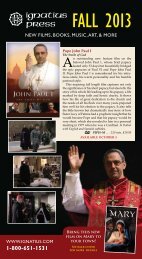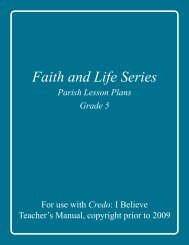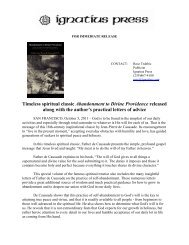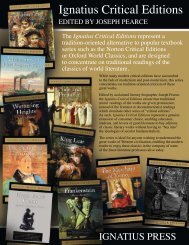Philippians, Colossians, and Philemon - Ignatius Press
Philippians, Colossians, and Philemon - Ignatius Press
Philippians, Colossians, and Philemon - Ignatius Press
Create successful ePaper yourself
Turn your PDF publications into a flip-book with our unique Google optimized e-Paper software.
2 Study Questions for the <strong>Ignatius</strong> Catholic Study Bible: The Letters of St. Paul to the<strong>Philippians</strong>, <strong>Colossians</strong>, <strong>and</strong> <strong>Philemon</strong>THE LETTER OF SAINT PAUL TO THE PHILIPPIANSChapter 1For underst<strong>and</strong>ing1. 1:1. How were the titles bishop, presbyter, <strong>and</strong> deacon understood when <strong>Philippians</strong>was written? Who were the Philippian bishops, <strong>and</strong> what did they do? What was therole of the deacons?2. 1:19. What scriptural references indicate that the Holy Spirit proceeds from both theFather <strong>and</strong> the Son? What names does Paul use for the Holy Spirit?3. 1:23. Why does Paul not hide his preference for martyrdom? What is the Catholictradition regarding what happens to the souls of the blessed at death?4. 1:29. What are some of the benefits for ourselves <strong>and</strong> others of our suffering? Howdoes Scripture depict suffering, <strong>and</strong> what is its challenge for us?For application1. 1:9–11. Read the note for v. 9. In the context of your Christian relationships (such asfamily, neighbors, or parish), what does it mean to love “with knowledge <strong>and</strong> alldiscernment”? What are some of the “fruits of righteousness” you can expect toexperience? (Hint: Look up Gal 5:22–23.)2. 1:15–18. What are some of the wrong motives you have had for sharing yourChristian faith? When have you shared it with the right motives? How did yourmotives affect the outcome (if at all)? What difference does Paul see in motive,here?3. 1:20. How do you live so as to honor Christ in your body? What are the challengesyou face? How might honoring him in your body take courage in yourcircumstances?4. 1:27–28. How does the life of your parish community reflect credit on the gospel ofChrist? As a group, how firm are you in your unity <strong>and</strong> striving for the faith? Howdoes your corporate behavior demonstrate that unity?Chapter 2For underst<strong>and</strong>ing1. Word Study: A Thing to Be Grasped (2:6). What interpretations of the Greek termharpagmos have been suggested for this verse? What seems to be the bestinterpretation? What does it indicate about Jesus?2. 2:10. To what OT verse does this verse allude? What does the divine oath proclaim?What reasoning does Paul use to insert Jesus into this prophecy?3. 2:12. What does it mean to “work out your own salvation”? What does “fear <strong>and</strong>trembling” have to do with it? What encouragement does Paul offer?4. 2:15. Why does Paul excerpt a saying from Deut 32:5? What is the lesson to belearned from the Exodus generation of Israel?For application1. 2:3. How has the course of your life reflected this verse—or stood in contrast to it?What kinds of people do you tend to look down upon? How can you “count others as
Study Questions for the <strong>Ignatius</strong> Catholic Study Bible: The Letters of St. Paul to the<strong>Philippians</strong>, <strong>Colossians</strong>, <strong>and</strong> <strong>Philemon</strong>3better than yourself” <strong>and</strong> maintain self-respect at the same time?2. 2:6–7. What is the one thing you most want to “hang onto” in life—the one thing ofwhich you would be most afraid to “empty yourself”? Why might God ask this of you?If he has asked it, what has your response been?3. 2:13. Have you noticed God at work in you, bringing you to the point of willing hisgood pleasure <strong>and</strong> working for it? To what incidents, trends, or circumstances canyou point that illustrate his work in you?4. 2:17–18. Do you know anyone who has “poured himself out” so that you might cometo faith or remain in it? What did this person do for you, <strong>and</strong> what kind of sacrifice doyou think it entailed? How can you repay such a sacrifice?Chapter 3For underst<strong>and</strong>ing1. 3:4–6. What credentials does Paul present to the <strong>Philippians</strong> in the face of theJudaizing missionaries, who dem<strong>and</strong>ed circumcision?2. 3:6. How was religious zeal sometimes expressed under the Old Covenant? Howdid Paul once emulate that type of zeal? What did he realize about it after hisconversion?3. 3:14. To what does Paul compare the Christian life? What does this analogy implyabout our salvation? What is Paul, like a sideline coach, urging his readers to do?4. 3:20. To what civic experience is Paul alluding in this verse? To what does hecompare it?For application1. 3:3–7. What are your “Christian credentials”? That is, what accomplishments,degrees, contacts, memberships, efforts, <strong>and</strong> so on, could you list that mightconvince people or God that you are a person of note? Whether you have anythingto list or not, how would you echo Paul’s sentiment in v. 7?2. 3:8. How do you know Christ Jesus as your Lord? Do you know him or only knowabout him? How would anyone else but you know whether your assessment isreliable? What is that relationship worth to you?3. 3:12–16. What is your attitude toward the call you have from God to be holy? Whatdoes it mean for you to be holy? (Hint: Review the chapter thus far.) How are you“straining forward” (v. 13) for it? Paul looks on a desire for holiness as a mark ofmaturity; what do you think of it (especially in the light of your own circumstances)?4. 3:17–19. How comfortable would you feel asking someone else to imitate yourChristian commitment? If you feel uncomfortable, how would you speak to those towhom Paul refers in vv. 18–19?Chapter 4For underst<strong>and</strong>ing1. 4:7. What is “the peace of God” to which Paul refers? What does Paul insist we doto obtain it?
4 Study Questions for the <strong>Ignatius</strong> Catholic Study Bible: The Letters of St. Paul to the<strong>Philippians</strong>, <strong>Colossians</strong>, <strong>and</strong> <strong>Philemon</strong>2. Word Study: Excellence (4:8). What does the Greek word aretē mean? Althoughthe word was common in ancient Greek, how does Peter use it? How does Paul usethe term in <strong>Philippians</strong>?3. 4:13. What does Paul mean by saying he can “do all things” in Christ?4. 4:22. What indication is there in this verse that the letter to the <strong>Philippians</strong> waswritten from Rome?For application1. 4:2–3. What has been your involvement in disagreements in your parish or faithcommunity? How have you tried to resolve them?2. 4:4–7. Why does Paul—<strong>and</strong> Jesus, for that matter (read Mt 6:25–34; Lk 10:41;12:25–29)—forbid anxiety? What kinds of anxiety do you experience in everydaylife? How might you do more to follow Paul’s advice in v. 4?3. 4:8. Have you tried to practice what Paul recommends in this verse? What effect hasit had on your prayer? If you have not tried to practice it, why not? What makesPaul’s recommendation more than mere “positive thinking”?4. 4:11–13. What is your “style” of complaining? What do you complain about? ThoughPaul does not say that he feels content, he indicates that he knows how to becontent. What would you say is his secret?THE LETTER OF SAINT PAUL TO THE COLOSSIANSChapter 1For underst<strong>and</strong>ing1. 1:13. From what <strong>and</strong> to what does Christ “transfer us”? What did the Council ofTrent declare in A.D. 1547 about the effects of justification in Christ?2. 1:15–20. What does the hymn quoted in these verses extol? What does the hymnsay Christ’s redeeming work transforms? What Old Testament personification doesChrist’s preexistence <strong>and</strong> role as Creator recall? Where else does Paul make thisassociation?3. 1:15. Although Adam was created in God’s image, what does it mean to say thatChrist is the image of God? If Adam was the first to bear the image of God, whathappened because of his rebellion against God? What is the role of Christ, then? Towhat does the term “first-born” refer in this verse? What is Paul’s point in using theterm?4. 1:18. To what does the analogy of Christ as “the head” point? What can it be used tostress? How is the Resurrection of Christ reproduced in the lives of believers?For application1. 1:3–5a. How grateful are you for the faith that you have? How often do you givethanks for the faith of others when you pray for them?2. 1:9–10. Read Is 11:2. What is the relationship between wisdom <strong>and</strong>underst<strong>and</strong>ing (two spiritual gifts you received at Confirmation)? How can you usethem to grow in the knowledge of God <strong>and</strong> of his will?3. 1:21–23. Locate the “if-clause” in these verses. What is the condition on which the
Study Questions for the <strong>Ignatius</strong> Catholic Study Bible: The Letters of St. Paul to the<strong>Philippians</strong>, <strong>Colossians</strong>, <strong>and</strong> <strong>Philemon</strong>5salvation Jesus won for you will be realized? To what two theological virtues doesPaul encourage continuing fidelity?4. 1:24. What could possibly be “lacking” in the sufferings of Christ for the Church?How might you make up in your own life for what is lacking in them, as Paul did inhis time?Chapter 2For underst<strong>and</strong>ing1. 2:8. How was the term “philosophy” understood when Paul was writing? Whatmeaning does Paul probably have in mind here? Of what “human traditions” is Paulthinking? Which traditions would Paul consider worth obeying?2. Word Study: Elemental Spirits (2:8). To what can the Greek term stoicheia refer?How are these ideas associated with worship among both Gentiles <strong>and</strong> Israelites?Why does Paul group the worship of both peoples together? How does he contrastthe Christian approach to the old order?3. 2:16. To what do the listed items “food . . . drink . . . festival . . . new moon . . .sabbath” refer in this verse? Why does Paul look on them as “only a shadow” in v.17?4. 2:21. Why does Paul strike out sarcastically at the Jewish agitators in Colossae inthis verse? What does he imply, by contrast?For application1. 2:8. Since God gave you a mind, how does he want you to use it to increase yourunderst<strong>and</strong>ing? How well do you know your faith? If not well, how can you defendyour faith against relatives, friends, or teachers who challenge it with apparentlyrational arguments? What are you doing to increase your underst<strong>and</strong>ing of the faith?2. 2:18–19. What do you think a “good Catholic” is? How would you compare Paul’swarning here with what you hear—or for that matter with what you say—aboutspiritual practices or experiences? Based on these verses, how do you think Paulwould describe a “good Catholic”?3. 2:20–23. In view of these verses, why does the Church insist on the need forpersonal penance <strong>and</strong> mortification? If Paul dismisses practices that “are of no valuein checking the indulgence of the flesh”, what would he promote? How do you try totame your self-indulgence into submission?Chapter 3For underst<strong>and</strong>ing1. 3:5. What does Paul urge us to do to the “old man”? What does he want us to dowith our lives instead?2. 3:11. Into what are believers drawn? Who are the “barbarians” Paul has in mind?Who are the Scythians?3. Word Study: Peace (3:15). To what does the biblical notion of peace apply? In whatis the peace of Christ rooted? How are Christians to spread this peace?4. 3:16. What is “the word of Christ” in this passage? How did the early Church honorthe Lord in song? How is musical praise reflected in the Book of Revelation?
6 Study Questions for the <strong>Ignatius</strong> Catholic Study Bible: The Letters of St. Paul to the<strong>Philippians</strong>, <strong>Colossians</strong>, <strong>and</strong> <strong>Philemon</strong>For application1. 3:1–2. Make a list of the top ten things in which you are most interested, includingthe things that most occupy your attention. How many of them have to do with“things that are above, not things on earth”? If you are concerned with practicalmatters (such as finances or raising children), how can you include them in the“things that are above”?2. 3:5–11. Of all the vices listed in these verses, which plagues you the most? Howhave you tried to “put it to death”? How serious are your efforts in this regard? Howcan your being a “new man”, with a new nature in Christ, be a help to you?3. 3:12–17. How might the practices Paul recommends here help you answer theprevious question? Of all these virtues, which are most <strong>and</strong> least characteristic ofyou? (How readily would your closest friend agree with your assessment?)4. 3:18–22. If you are married, how well do you respect your spouse? In what conditionis your relationship with your parents (regardless of how old you are)? Whatmotivates you in the way you do your job at work? How closely do any of youranswers match what Paul would expect of you?Chapter 4For underst<strong>and</strong>ing1. 4:2. What kind of prayer does Paul promote here? Why?2. 4:16. In what setting were Paul’s letters to the Churches most likely read publicly?What is “the letter from La-odicea”?3. 4:18. How did Paul write his letters? What did his own h<strong>and</strong>written remarks do forthe letters?For application1. 4:1. If you are an employer or a supervisor, how do you treat your subordinates?What does it mean in your circumstances to treat them with justice?2. 4:2. How regular are you in your prayer life? If you have not prayed regularly, whatare you now doing to establish a habit of prayer? If you do pray regularly, do youinclude thanksgiving <strong>and</strong> adoration in your prayer, as well as requests for what you<strong>and</strong> others need?3. 4:5–6. How do you conduct yourself toward persons who are not Christian? Whatimage of Christianity would your friends <strong>and</strong> acquaintances have based on yourbehavior in mixed company?4. 4:17. How do you encourage bishops, priests, deacons, religious, <strong>and</strong> others whowork for the faith in their apostolates? How often do you pray for them?THE LETTER OF SAINT PAUL TO PHILEMONFor underst<strong>and</strong>ing1. v. 9. Why does Paul refer to himself in this verse as an elderly man? Why is theGreek word for “elderly man” translated “ambassador” here?
Study Questions for the <strong>Ignatius</strong> Catholic Study Bible: The Letters of St. Paul to the<strong>Philippians</strong>, <strong>Colossians</strong>, <strong>and</strong> <strong>Philemon</strong>72. v. 11. What wordplay is Paul making on Onesimus’ name? What indicates thatOnesimus is ready to live up to his name?3. v. 16. With what kind of dilemma is <strong>Philemon</strong> faced? In Paul’s mind, what is<strong>Philemon</strong>’s recommended option? Why?4. vv. 23–24. What evidence suggests that the letter to <strong>Philemon</strong> was written at thesame time <strong>and</strong> from the same place as <strong>Colossians</strong>? What evidence indicates thatPaul sent these letters to believers in the same region (Asia Minor)?For application1. vv. 4–7. How often have you been verbally encouraged by fellow Catholics in thepractice of your faith? What has been the effect of being (or not being) soencouraged? How often have you given this sort of encouragement?2. vv. 8–9. In a family or professional relationship, what is the point of saying, “I couldtell you to do this, but I’d prefer to ask you to do it”? What does the speaker hope togain? (Hint: Compare vv. 14 <strong>and</strong> 21.) How might this approach communicate respectfor the one addressed?3. vv. 10–13. What is the risk that Paul <strong>and</strong> Onesimus are both taking with <strong>Philemon</strong>?What kind of confidence in God are they showing? What kinds of spiritual risks areyou willing to take in situations where the outcome is both unknown <strong>and</strong> critical?4. vv. 18–19. Think about the saying, “Fool me once, shame on you; fool me twice,shame on me.” Keeping in mind what Jesus says about how often we must forgivewrongs (for example, in Mt 18:22 or Lk 17:4), how Christian a saying is this? Wouldyou be willing to vouch for the reformed character of someone who admitted to youthat he had wronged the person to whom you are talking?




